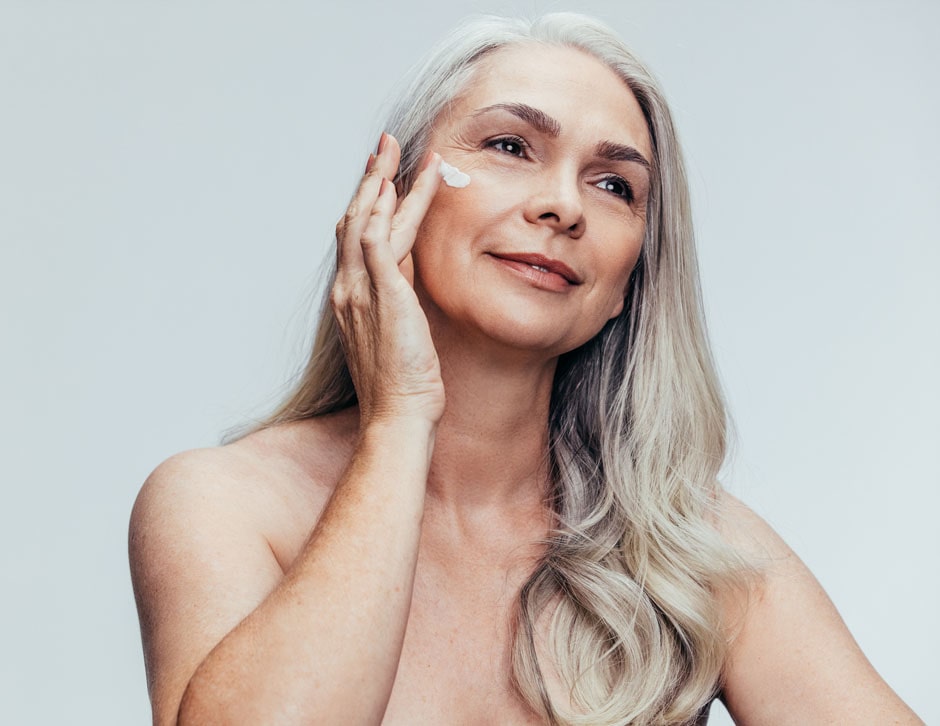
If you’re feeling a little irritated, you’re not alone. More than half of all men and women deal with sensitive skin in some form and many of these sensitivities worsen with age. The good news? There’s a lot you can do to soothe and manage the skin you’re in.
In this blog post, we explore:
- What is “sensitive skin” and why is it worse as we age?
- What should I avoid if I have sensitive skin?
- What are the best products for sensitive skin?
- What else can I do for sensitive skin?
What is “sensitive skin” and why is it worse as we age?
It’s estimated that 60-70 percent of women (50-60% of men) suffer from sensitive skin. The range of reasons for sensitive skin runs the gamut of genetics, ethnicity, environment, sex and…drum roll…age.
As we age, the natural skin barrier breaks down. Skin irritations can look and feel more pronounced or simply just don’t heal as quickly. Moisture reserves and the yummy, oily stuff like collagen and elastin that help protect the dermis and epidermis layers decrease after age 25. Skin is more vulnerable and just generally more reactive to everything from pollution to cosmetics.
If you notice any of the common signs of sensitive skin (adult acne breakouts from new skincare products or stress; rashes, hives from an allergy; itchiness and redness or burning that could be caused by rosacea or an overuse of a certain products; dry patches perhaps from eczema or even seasonal allergies), it’s important to check in with your dermatologist.
While many skin sensitivities can be treated at home with over the counter products, some require prescriptive care.
What should I avoid if I have sensitive skin?
The list of what you should avoid can feel long and annoying when you have sensitive skin, but a good rule of thumb is to stay away from facial products with fragrances, scents and harsh chemicals. Ditto for anything rough like exfoliants, peels or scrubs. Most astringents and toners are also out as they likely include witch hazel or alcohol and these dry out your skin.
Experts also say to stop overwashing your face. It’s important to let the skin’s natural oils work their magic. If you’ve been washing your face twice a day, switch to once in the evening and use a simple, made-for-sensitive-skin wash.
What are the best products for sensitive skin?
First and foremost, you want something that’s going to help restore your natural moisture barrier. Think of it like you’re building back a brick wall to protect your precious facial skin from invaders. Look for products with ceramides (waxy, lipid molecules made with a fatty acid) and niacinamide (a skin protectant that controls inflammatory responses). Oatmeal has also been shown to have skin calming effects. AgelessRX’s DMAE Firming Gel, hydrates like a pro and helps lock in all the other layers of your skincare products.
When washing your face (remember, once a day) don’t over scrub. Use a creamy soap made for sensitive skin like Cetaphil, Dove DermSeries, Cerave or First Aid Beauty.
Your moisturizers and cosmetics should be free of dyes, fragrance, chemicals and other possible irritants.
What else can I do for sensitive skin?
Avoid your triggers. If you find you have sensitive skin because of a condition like rosacea, for example, steer clear of spicy foods, red wine or anything else that’s known to exacerbate your symptoms. Stay out of the sun as much as possible and when you’re in it, protect yourself with a high SPF cream. Try to minimize stress. Science tells us that there’s a very real “Brain-Skin Connection” and anxiety, depression or everyday stress can only worsen skin flare-ups. So, work on maintaining proper sleep, getting daily exercise, eating right and keeping calm.